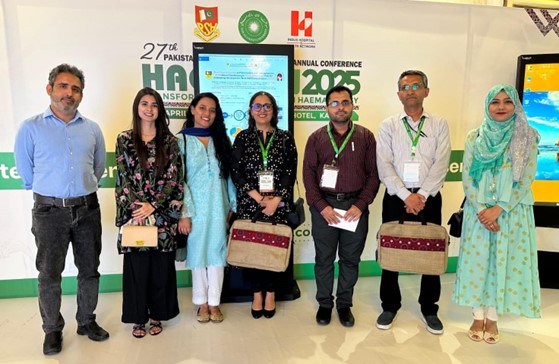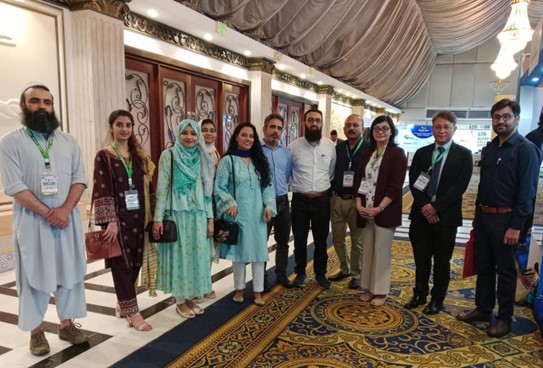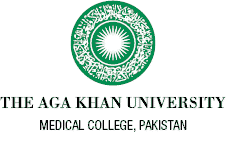Happenings in Pathology:
Aga Khan University Shines at HAEMCON 2025
Dr Hareem Alam, Hematology
The 27th Annual Conference of the Pakistan Society of Hematology was held at the Marriott Hotel, Karachi, from April 17th to 20th, 2025 under the supervision of Professor Dr Bushra Moiz [AKU] (Chair Scientific Committee HeamCon 2025) and Dr Saba Jamal [IHHN] (Chair Organizing Committee HeamCon 2025). Five successful pre-conference workshops were conducted, covering topics such as diagnostic challenges in molecular hematopathology, case-based learning and hands-on practice in coagulation, integrated diagnostic hematology, immunohematology in transfusion medicine, and a case-based and hands-on workshop on hemoglobin disorders.
The conference commenced with an inaugural session, moderated by Dr. Sana Brohi (AKU) and Dr. Hareem Alam (AKU). The Ibne Sina Lecture was delivered by Maj. Gen (R) Dr. Pervez Ahmed, who spoke on bone marrow transplantation and cellular therapies in Pakistan. The keynote address was given by Dr. Flora Peyvandi, Professor of Internal Medicine at the University of Milan, Italy. The Lifetime Achievement Award was presented to Maj. Gen (R) Suhaib Ahmed, and a posthumous award was given to Dr. Tahir Shamsi (late). The session concluded with the opening of the exhibition by the conference patrons i.e. Distinguished University Professor Dr Mohammad Khurshid (AKU) and Dr Khalid Zafar Hashmi (SIUT).
Over the following three days, eight scientific sessions were held. Each session featured three free research paper presentations, followed by three invited talks by national and international speakers, and concluded with a panel discussion.
Aga Khan University's significant participation in HAEMCON 2025 included:
Professor Dr. Bushra Moiz chaired the Scientific Committee of the conference.
Dr. Shariq Shaikh, Dr. Muhammad Hasan, and Dr. Zeeshan Ansar served as facilitators for the workshops.
Professor Dr. Salman Adil chaired the session on acute leukemia and bone marrow failure.
The session on challenges in transfusion was chaired by Professor Dr. Muhammad Khurshid, with the panel discussion led by Dr. Muhammad Hasan.
Professor Dr. Usman Shaikh chaired the session on myeloproliferative neoplasms, moderated by Dr. Nabiha Saeed.
Professor Dr. Bushra Moiz co-chaired the session on advancing hematology.
Dr. Zeeshan Ansar delivered a talk on molecular screening for alpha and beta thalassemia.
Professor Dr. Zehra Fadoo spoke on pediatric acute myeloid leukemia.
Professor Dr. Natasha Ali gave an outstanding talk on transplant viral infections, focusing on CMV.
Dr. Afsar Ali Mian discussed gene editing technologies for hemoglobinopathies.
Posters were presented by Dr. Haleema Urooj (R-V), Dr. Fatima Farhan (R-IV), Dr Muhammad Shayan Ashfaq (R-III), Dr. Wajeeha Iftikhar (R-II), Ms. Anila Zafar (Senior Technologist Hematology) & Muhammad Salman (Charge Technologist Blood Bank).
Dr. Fatima Farhan (Hematology R-IV) served as the overall moderator of the conference.
The conference concluded with an award ceremony highlighting the achievements of our residents and staff:
Dr. Muhammad Umer Naeem Effendi (Chemical Pathology R-V) received the first prize in oral presentation for his research paper on the 'Prevalence and clinical utility of anti-β2 Glycoprotein-1 antibodies in Pakistani patients suspected of Antiphospholipid syndrome'. (Co-Authors: Dr Hafsa Majid, Dr Bushra Moiz, Dr Lena Jafri & Dr Aysha Habib Khan)
The first prize for poster presentation was jointly awarded to Hematology Residents Dr. Haleema Urooj (R-V) [Co-Author: Dr Bushra Moiz], Dr. Fatima Farhan (R-IV) [Co-Author: Dr Sana Brohi], and Dr. Wajeeha Iftikhar (R-II) [Co-Authors: Dr Zehra Fadoo, Dr Bushra Moiz, Dr Salman Kirmani, Dr Ali Hussain & Dr Fizza Akbar].
A complimentary prize was presented to Ms. Anila Zafar, Senior Technologist Hematology, for her poster on the 'Significance of white cell ratio as biomarker in mosquito borne infections' [Co-Author: Dr Bushra Moiz].
These accomplishments marked a proud and memorable conclusion to the conference for our department.








x----------------------------x-------------------------x
Connecting with Pathology: Exploring our Facebook Page and Website
Dr Sana Brohi, Hematology
In today's digitally driven healthcare landscape, maintaining a strong online presence is crucial for pathology labs to connect with patients, share services, and establish trust. To strengthen its outreach and accessibility, the Department of Pathology & Laboratory Medicine at AKU has launched a dedicated Facebook page and is in the process of enhancing its existing website.
AKU's Facebook page (link: https://www.facebook.com/profile.php?id= 61574240963703) will serve as an effective platform to directly engage with patients, caregivers and students. It will feature high-quality visuals, including images of the facility, advanced equipment, and staff, along with detailed information about available tests to enhance trust and credibility. Consistent updates—such as announcements on test availability, health tips, promotional packages, and patient feedback—will help keep the page dynamic and informative.
The website (link: https://www.aku.edu/mcpk/pathology/Pages/home.aspx) for the Department of Pathology and Laboratory Medicine at Aga Khan University serves as a comprehensive resource, showcasing the department's key functions in diagnostics, education, research, and clinical services. It offers detailed information about the various branches of pathology, faculty, and laboratory networks across Pakistan. The site also highlights available pathology services, quality standards, and professional development opportunities, making it valuable for students, healthcare professionals, and patients. Furthermore, the website features regular updates through Lablog posts, a Memory Book, and a "Meet Our Team" section, providing a thorough overview of the department's vibrant academic and clinical landscape.
We kindly request LabRad readers to click on the links below, like our Facebook page, and explore our website.
Links:
Facebook link: https://www.facebook.com/profile.php?id= 61574240963703
Website link: https://www.aku.edu/mcpk/pathology/Pages/home.aspx



